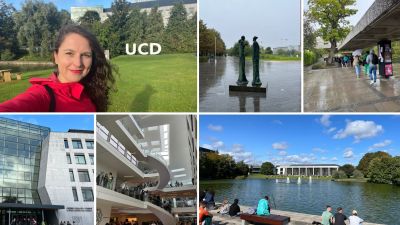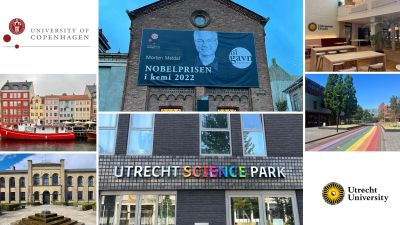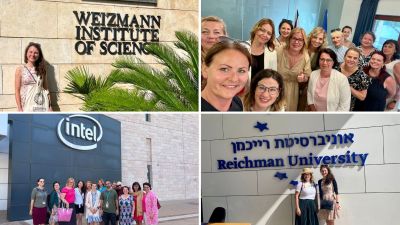At the Technische Universität Berlin (TU Berlin), great emphasis is placed on collaboration, both between faculties and disciplines, but also across Berlin universities. Nor are "transferring knowledge into practice and solving society-wide challenges" empty phrases. Nor did they shy away from tasks such as a new website, a shared intranet or a modernisation of the logo. Pavla Hubálková found out more for Forum magazine as part of her Erasmus internship.
Although the name might suggest that the Technische Universität Berlin "TU Berlin" is focused only on technical disciplines, the opposite is true. "The range of study fields and research projects is truly diverse and interdisciplinary – from traditional technical and engineering disciplines, we cover natural sciences, architecture, economics and management, as well as social sciences and humanities," says Wolfgang Richter from the TU Berlin's communications department.
At the same time, if you type "science communication in Berlin" into an internet search engine, TU Berlin comes up first. Their activities in this area are varied – they collaborate with journalists, host science communication workshops and media training for students and academics, organise popular science slams, as well as "open science" projects in which the general public is widely involved.
What works for them? "For example, we recently cancelled physical press conferences – hardly anyone goes to them anymore. Instead, we hold them online, which has had a very positive response. We also often contact local newspapers directly and explain why this particular topic might be of interest to their readers," Wolfgang Richter explains.
The new website and an intranet you want to use
TU Berlin has recently undergone a major website upgrade. "It was a huge project that was divided into several phases. Work on the new website officially started in 2017, but there had been talk of modernisation for several years before that. For example, there was a big survey across the university that involved over two thousand participants. However, this did not prove to be very effective, because every person has an opinion and you have to accept that you will never please everyone," describe Christine Kreutzer and Ulrike Friedrich, who were in charge of the new website project. They then involved only the most important people in the discussions. "Although external companies created the website for us, they always worked closely with our IT department because we wanted to be able to continue to manage it ourselves. We launched the new website in 2020, but we are constantly updating and improving it," they share. A team of about five people runs the website, while about two and a half thousand users having editorial rights. "We have created all sorts of practical manuals, and our user support is also available to editors to respond to their feedback or requests," adds the site managers.
Currently, TU Berlin has also launched a trial version of the intranet. "The intranet is being developed according to our wishes and needs by the external company Haiilo, which specialises in intranets and thus has a lot of experience and can advise us on the best solution. In addition, they have wonderful user manuals and tutorials," says project coordinator Laura Brönstrup. They signed the contract in the summer of 2023, now have a first beta version in operation and a full launch planned for this autumn.
"Our goal is to build a user-friendly and useful intranet that employees will want to use. It runs on the cloud, can be personalised and is also linked to other university systems via single sign-on. It can be accessed from anywhere and also via a mobile app," lists Laura Brönstrup and adds: "Visual design and intuitive operation were important criteria. In addition, the intranet has features that we are all familiar with from social networks. You can chat, share public and non-public posts, and each user can create groups."
|
Mathematician Geraldine Rauch: Germany's youngest female university leader and TU Berlin's first ever female president
"We are facing tremendous ecological and social challenges, including climate change, demographic change, and the energy and transport transition. TU Berlin will play a key role in this. Our university must serve as the central pillar of technology transfer and social integration in Berlin. No other university has the technological profile to take on these issues. And, no other university also offers its breadth of humanities, social sciences, and business and management subjects to drive real change in society. Now is the time to strengthen and openly showcase our areas of focus – within the Berlin University Alliance, Germany, and beyond," she said upon her election. |
Everything becomes stronger by working together
At TU Berlin, there is a strong emphasis on collaboration, both between faculties and disciplines, but also across Berlin universities. The result is a formal network – the Berlin University Alliance (BUA), which links Freie Universität Berlin, Humboldt-Universität zu Berlin, Technische Universität Berlin and Charité – Universitätsmedizin Berlin.
"Berlin is already an outstanding research location, but everything becomes stronger through collaboration. The Berlin University Alliance is an important signal that we are all heading down the same path and saying the same things, namely: Science here is not going to be conducted purely by individual institutions, because we can achieve more as a consortium," said Geraldine Rauch, President of TU Berlin and currently also spokesperson for the Berlin University Alliance, in an interview with We Four magazine. In addition to sharing research infrastructure and know-how, they also collaborate on the Postdoc academy, for example.
"In the beginning, many people were sceptical about the formation of the alliance, but this is gradually changing as they see the benefits that BUA brings," says Julie Spielmann, who represents TU Berlin in the university alliance’s communication department. At the same time, she stresses that good information and communication of the benefits is key, not only among the academic community but also to the general public. For example, they are planning a major information campaign across Berlin in the coming months.
Ready to meet the challenges of the future
"Translating knowledge into practice and addressing society-wide challenges" are not just phrases at TU Berlin. They support technology transfer (for example, through the Transfer School or annual competitions), provide facilities for around 15 startups, and offer interdisciplinary courses and special certificates in the style of the European micro-certificates, but they are offered free of charge to all.
An example is the long popular Critical Sustainability Certificate, which often sees ninety students from forty different study programmes in one semester. "These are not lectures, but very interactive discussions in small and large groups. We also started doing them online during Covid, which brought in students from abroad," says head lecturer André Baier.
Similarly, they offer, for example, the Transfer Certificate, which aims to teach a group of about fifteen learners over the course of a semester how to use their expertise to solve complex, society-wide problems. "Through various workshops, consultations and feedback, we try to equip students with the skills to use their expertise outside their field for the good of society," says head lecturer Thies Johannsen.
| From TU Berlin to Earth orbit
TU Berlin is the leading university worldwide in terms of the number of satellites in Earth orbit. Recently, they successfully launched two nanosatellites to perform formation flight in orbit for the first time. Because of the university environments, students are involved in all phases, from construction to operation. “The best way to learn is, of course, hands-on, using real equipment. However, our missions are not just there to help train students – the primary mission objective is technological development, as well as the range of direct benefits and new insights for science,” stresses Jens Freymuth from the Space Technology research team. |
We care about you even after graduation
At TU Berlin, it doesn't end with your studies; they also place great emphasis on their alumni. "We have a perhaps unusually broad definition of who can become a member of our alumni community. In addition to graduates, people who have been on a study or research fellowship at TU Berlin as well as former employees can join," says Juliane Wilhelm, one of the coordinators of the Alumni Programme, which currently has over 37,000 members from 147 countries. In addition to traditional activities such as alumni reunions, mentoring and "Career orientation", where alumni share their internship experiences, they also put a lot of effort into international networking. "We present our current international students with examples of our alumni and present them with opportunities for further employment in Germany," she says, citing podcasts as an example.
In cooperation with scientists from TU Berlin, they also organise the popular International Alumni Training – seven to ten-day workshops on a variety of interdisciplinary topics. "International alumni have the opportunity for professional development and networking at interdisciplinary seminars and workshops. The main goal of these activities is to share, exchange experiences and establish possible international partnerships. Events are held in Berlin, but also in Brazil, Ghana, Cairo and many other countries," says Juliane Wilhelm.





















